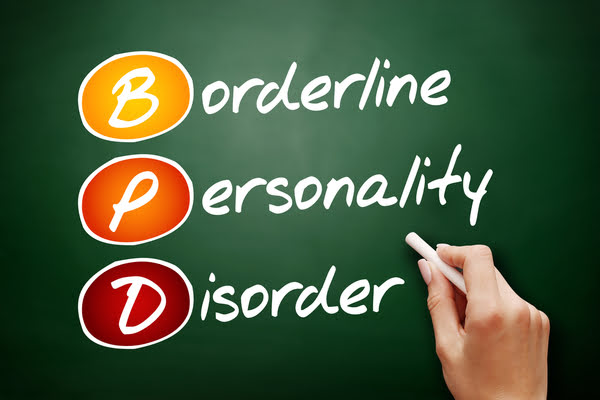Borderline Personality Disorder (BPD) is a mental health condition characterized by the following symptoms:
- Impulsivity
- Unstable/negative identity
- Chronic feelings of emptiness
- High rejection sensitivity1
- Self-harm
- Emotional volatility
- Chronic fears of abandonment
- Bursts of rage
- Paranoid thoughts
- Inability to tolerate separation
The term originated when psychiatrists noted that some people with schizophrenia were neither neurotic nor psychotic. They were on the borderline. They didn’t experience hallucinations, but still, their reality seemed distorted.

Their reality was distorted by how they felt about certain situations and memories.2
In particular, they distorted their reality through their hyperactive defense mechanisms. These defense mechanisms are present in all people. But in people with BPD, they go into overdrive.
What causes BPD?
BPD is likely the result of attachment issues in childhood.3
An unstable sense of self is a core symptom of BPD. An unstable sense of self develops when a child cannot securely attach to her caregivers.
Secure attachment can be disrupted by abuse, neglect, and unpredictable environments where a child sometimes receives the love of their caregiver and sometimes doesn’t, with no logic or rule behind it.
A child lacking in self-image and made to feel worthless grows up to develop a negative identity. This negative identity induces shame, and they spend the rest of their life ‘defending’ themselves from that shame.
This explains why people with BPD, when triggered, can go into a fiery rage and why they’re so sensitive to rejection. Any real or perceived rejection activates their shame wound, and they feel the need to defend themselves.
When their inner sense of shame overwhelms them, they might even engage in self-harm.
They intensely crave connection and attachment but, at the same time, are fearful of it. They’re likely to develop a fearful-avoidant attachment style.
Signs a BPD loves you
People vary in how they express their love to others. You might have heard of love languages. People with BPD also vary in how they show love.
Still, there are some commonalities that you’re likely to observe in people with BPD.
1. Idealization
A person with BPD quickly idealizes someone they have a crush on or have fallen in love with. Why does this happen?
It mainly stems from a BPD’s lack of identity.
Since a BPD has no, or a weak sense of, identity, they become a magnet for other identities. Essentially, a BPD idealizing their romantic interest is them seeking someone to identify with.
If a person with BPD loves you, you’ll become their favorite person. Their life will revolve around yours. You’ll become the main topic of their life. Your identity will become theirs. They’ll mirror who you are.
2. Intense connection
Idealization also stems from a BPD’s intense need for connection and attachment.
Our minds see our romantic relationships as similar to those with our primary caregivers. Since someone with BPD experienced detachment from their caregiver, they now seek that unmet need for attachment from you, and to the same degree.
They’re essentially seeking to win the love and attention of a parental figure.
This is why a person with BPD experiences intense and rapid attachment. It can be too much for you when you’re on the receiving end of that love and attention.
3. Clinginess
At the root of BPD, as with many other disorders, is shame and a fear of abandonment.
Fear of abandonment drives a person with BPD to cling to you and shower you with love, time, and attention. They expect the same in return. If you don’t return their clinginess with your own, you activate their ‘ready-to-fire’ defense mechanisms.
They’ll become enraged and devalue you if they feel the slightest hint of rejection. This is the classic ‘idealization-devaluation’ cycle we also see with narcissists.
4. Impulsive acts of affection
A person with BPD may surprise you with gifts, trips, and visitations out of nowhere. Their impulsivity can make them quite fun and exciting to be with. They constantly seek novelty in relationships.
5. They work on themselves
They may realize they’re messing up their relationship and decide to work on themselves. They may read, get therapy and do what they can to manage their condition.
It’s a sign they’re serious about understanding themselves and maintaining their relationship with you. This is difficult work for them. Self-reflection is hard for them because they barely have any ‘self’ to reflect on.
They may also try to understand you to improve their interactions with you. You’ll often find them engaging in deep conversations about themselves and you.
6. They accept your imperfections
It’s difficult for a person with BPD to come out of the honeymoon phase of a romantic relationship.
In the honeymoon phase, people tend to idealize their romantic partners. When the chemicals wear off, and they’re confronted with their partner’s flaws, they tend to accept them and develop a stable bond.
This is hard for a BPD to do because they view people and things as either good or bad (idealization-devaluation). When the honeymoon phase is over, they will likely see their partner as ‘all-bad’ and forget that they were idealizing the same person months ago.
So, if someone with BPD accepts your flaws and imperfections, it’s a huge milestone. It takes them more effort than the average person to do that.
References
- Staebler, K., Helbing, E., Rosenbach, C., & Renneberg, B. (2011). Rejection sensitivity and borderline personality disorder. Clinical psychology & psychotherapy, 18(4), 275-283.
- Wygant, S. (2012). The Etiology, Causative Factors, Diagnosis, & Treatment of Borderline Personality Disorder.
- Levy, K. N., Beeney, J. E., & Temes, C. M. (2011). Attachment and its vicissitudes in borderline personality disorder. Current psychiatry reports, 13, 50-59.
